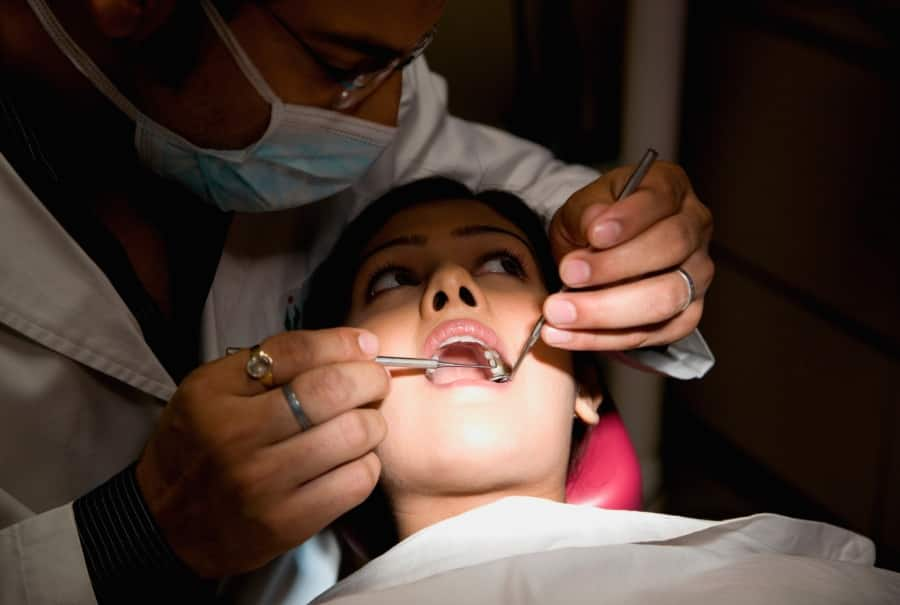What Do Swollen Gums Mean?
Swollen gums are a condition related to gum disease. Simply put, you can say that you have swollen gums if they are puffy, inflamed, or enlarged. In many cases, this swelling affects the triangular areas of gum tissue, known as papillae, located between the teeth. Swollen gums typically arise from the accumulation of white blood cells and fluids reacting to irritation and inflammation caused by bacteria and plaque along the gum line.
What Causes Swollen Gums?
Swollen gums can result from various factors, including poor oral hygiene and any other underlying health conditions. Before finding a treatment for swollen gums, it is crucial to understand the root cause of the problem. Identifying the cause of your swollen gums can help in effectively addressing the gum inflammation and preventing its recurrence. Below are some of the most common causes of swollen gums.
1. Food Debris
Food particles getting stuck between teeth and gums can lead to gum irritation and swelling. The swelling usually occurs around a single tooth and is due to decay and inflammation. Food debris is a common cause of swollen gums, but the swelling may go away if you can get the debris out of under your gums through brushing or flossing. You can also try rinsing your mouth thoroughly to dislodge any remaining particles. However, be careful not to pick at your gums, as this can cause injury. If the swelling does not subside within a couple of days, it is recommended to seek the help of a dental professional.
2. Gum Disease
Gum disease is a prevalent condition characterised by inflammation and infection of the gum tissues surrounding the teeth. This is caused by the buildup of bacteria around the gum line and has turned into plaque (a soft, sticky, colourless film). In the earliest stages of gum disease, commonly known as gingivitis, you may experience red and sore gums. If your gingivitis goes untreated, your inflammation can develop into a more severe condition called periodontitis. Luckily, gum disease is preventable by practising good oral hygiene, and its more severe stages can be treated with deep cleaning (and, in some cases, surgery).
3. Abscessed Tooth
An abscessed tooth is a small sac of pus in your gums caused by a bacterial infection. Most often, bacteria reach the blood vessels and nerves in your tooth's pulp (the inner chamber) because of tooth decay or a broken or fractured tooth, but tooth abscesses can also result from gum disease. The common signs include throbbing pain, red or swollen gums, a swollen jaw or face, a tender or sore tooth, a fever, and even a salty taste in your mouth. See your dental professional for treatment immediately if you have an abscessed tooth. They are not usually dangerous, but the infection can spread in rare situations and create serious complications.
4. Periodontal Disease
Periodontitis is a bacterial infection that destroys the supporting structures holding your teeth in place. The first line of defence against bacterial infection is always the gums. Once the infection has broken through the gums, it can attack the ligaments and bones that hold the teeth in the mouth, resulting in swollen gums. Due to bacterial erosion, you may experience bone loss, which will cause the pocket (the space between the gum and tooth) to grow deeper and wider. Consequently, pus develops between the teeth and the gum. If left untreated, it can result in severe gum pain and lead to other dental issues.
Other Potential Causes
In addition to the causes mentioned above, there are several other potential causes of swollen gums. Among the common reasons for swollen gums are the following:
Medications: Swollen gums might be a side effect of newly prescribed medication. Talk to your doctor about any medication-related side effects to find out about other alternative options.
Smoking: The chemicals present in cigarette smoke and tobacco can lead to irritation of the gum tissue, resulting in swollen gums and various other gum-related issues.
Brand switch: Swelling in your gums could be a reaction to a recent switch in your toothpaste or mouthwash brand, potentially due to a sensitivity to certain ingredients.
Poor nutrition: Inadequate intake of fruits and vegetables, leading to malnutrition or a deficiency in Vitamin C, can result in inflamed gums. Therefore, your diet might be a contributing factor to gum inflammation.
Fitted dental appliances: Wearing braces, retainers, or dentures can sometimes lead to swollen or tender gums. You should consult your dentist to adjust the fit of your appliances to minimise gum irritation.
- Gum infections: Swollen gums can also be caused by viral and fungal infections, which irritate the gum tissue and lead to inflammation.
Swollen Gums Treatment
If you are looking for swollen gums treatment, professional medical treatment and home remedies are available. However, it is always best to consult with a dental professional to treat your swollen gums rather than attempting to treat them yourself.
Medical Treatment
If you have swollen gums, the best course of treatment depends on the underlying cause. If the swelling is caused by gum disease or periodontitis, seek advice from a dentist or periodontist who can provide effective treatment options.
Common treatments for gum disease include taking medications, tooth scaling, and root planing. If your swollen gums are isolated to one tooth, it may be due to a dental abscess, and your dentist may recommend root canal therapy or tooth extraction to address the issue.
Home Remedies
There are some home remedies for swollen gums that you can try to relieve the pain. However, caution is important when trying these remedies, as no scientific evidence supports their effectiveness. If your gums remain swollen for a prolonged time, it is best to seek advice from a dentist. In the meantime, you can try these remedies to help alleviate the discomfort:
Saltwater rinses: For mildly swollen gums, cleaning the gums properly and swishing salt water around in your mouth is considered to help reduce swelling.
Cold compress: For bleeding gums, a gauze pad dipped in ice water or a damp tea bag pressed on the site may provide relief.
Over-the-counter pain relievers: In cases of severe gum pain due to swollen gums, taking over-the-counter pain relievers could help alleviate discomfort and inflammation temporarily.
How to Prevent Swollen Gums?
Preventing swollen gums can be easy if you adopt good dental hygiene practices. Here are some preventive measures that you can take to reduce the risk of gum inflammation and maintain good oral health:
Brushing and Flossing
Brush your teeth twice a day with advanced toothpaste to remove plaque and bacteria from the tooth surfaces and along the gum line. Pair it with a soft-bristled toothbrush and brush in a gentle, circular motion to avoid irritating your gums. Additionally, remember to floss daily to clean between your teeth and along the gum line, where your toothbrush cannot reach.
Colgate Total Advanced Health is a good choice if you are looking for a toothpaste that addresses all your dental health concerns. Using Colgate Total Advanced Health toothpaste can help keep your whole mouth healthy. It is an antibacterial toothpaste that fights germs for 12 hours on teeth, tongue, cheeks, and gums. Unlike ordinary toothpaste, it has Dual Zinc and Arginine technology, actively seeking out bacteria and forming a protective, anti-germ barrier.
Regular Dental Check-ups
Regular dental check-ups and cleanings are essential in identifying early signs of gum disease and removing plaque and tartar that could lead to dental problems. You should visit your healthcare professional every six months for professional dental cleanings and an extensive oral examination. Through regular dental check-ups, you can identify any dental issues early on and receive personalised treatment and oral care.
Balanced Diet
A nutritious diet rich in fruits, vegetables, whole grains, and proteins provides essential nutrients for gum health. Vitamin C, in particular, plays a crucial role in supporting healthy gums, so be sure to include plenty of fruits and vegetables in your diet. Limit sugary and acidic foods and beverages, which can contribute to plaque buildup and gum inflammation.
To conclude, swollen gums are a common issue that can stem from various causes, such as poor oral hygiene and underlying health issues. Understanding these factors is crucial in order to take appropriate preventive measures. Maintaining good oral hygiene through regular brushing, flossing, dental check-ups, and a balanced diet can significantly lower the risk of gum inflammation. Remember, dental health plays a vital role in your overall well-being, so seeking professional guidance and care is important when necessary.
Frequently Asked Questions
1. How long does a swollen gum last?
The duration of swollen gums can vary depending on the underlying cause and individual factors. In some cases, mild swelling may resolve on its own within a few days with proper oral hygiene and home care. However, persistent or severe swelling may indicate a more serious underlying issue and may require professional dental treatment.
2. Which medicine is best for gum swelling?
If you are looking for medicine for swollen gums, you can try over-the-counter pain relievers. They can help relieve discomfort and reduce pain. However, if your gums remain swollen even after taking medicine, it is important to consult a dental professional.
3. What is the fastest way to heal a gum infection?
The fastest way to treat a gum infection is to consult a dentist. However, you can also try over-the-counter pain relievers and home remedies for inflamed gums to achieve temporary relief.
4. How can I relieve gum pain at home?
To relieve gum pain at home, try rinsing with warm salt water or applying a cold compress to the affected area. Over-the-counter pain relievers can also help alleviate discomfort. If the pain persists or worsens after trying the home remedies for swollen gums, it is important to seek professional dental care for further evaluation and treatment.
This article is intended to promote understanding of and knowledge about general oral health topics. It is not intended to be a substitute for professional advice, diagnosis or treatment. Always seek the advice of your dentist or other qualified healthcare provider with any questions you may have regarding a medical condition or treatment.
ORAL HEALTH QUIZ
What's behind your smile?
Take our Oral Health assessment to get the most from your oral care routine
ORAL HEALTH QUIZ
What's behind your smile?
Take our Oral Health assessment to get the most from your oral care routine













